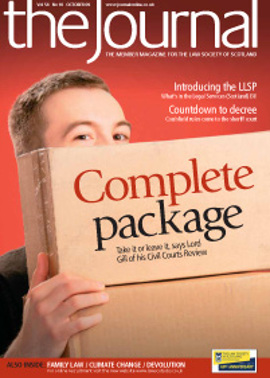Money and your life

Marriage contracts: personal choice
At one time it was relatively common for marrying couples (or at least those with significant property) to enter into marriage contracts with each other, or to create antenuptial trust settlements in favour of the wife. This was necessary to avoid the draconian common law effects that marriage had on a woman’s right to own property. But these effects were gradually removed over a 60 year period between 1861 and 1920, after which time a married woman was permitted not only to own property but also to administer it on her own behalf. Revolutionary stuff, and given explicit recognition in statute by s 24 of the Family Law (Scotland) Act 1985.
Since 1920 the popularity of marriage contracts and marriage trusts has all but evaporated. Writing in 2005 in his book Family Law Agreements, the practitioner/author George Jamieson positively advises Scottish solicitors against recommending to their clients that they enter into marriage agreements, for a number of reasons, including the fact that the 1985 Act creates a “fair and sensible system” for property distribution on divorce. He also warns that “it is generally undesirable to discuss the arrangements for the breakdown of a marriage before it has begun or at regular intervals during the marriage: this may damage or destroy the trust between the parties to the contemplated marriage, or become a recurring source of trouble after marriage”.
Nevertheless, on the website of at least one Scottish legal firm, it is suggested that the frequency with which clients request advice about entering marriage contracts is increasing once more. There may sometimes be good reason for a married or civilly empartnered couple to regulate their affairs by a personal contract rather than leaving their property relationship to the default rules set out in Scots law.
It is, for example, relatively common for persons marrying for a second or subsequent time to feel aggrieved at their treatment by the courts during their previous divorce: such people frequently wish to keep things under their own control in the future. Or there may be doubt as to which legal system governs the marital/property relationship, which can be removed by a marriage contract choosing as its proper law the system most conducive to the parties’ wishes. And for the exceptionally wealthy, whose assets far outstrip reasonable needs, autonomy might be considered more important than equality of relationship. Unlike English law, where pre-nuptial agreements are unenforceable but will be given “due weight” (Radmacher v Granatino [2009] EWCA Civ 649), Scots law has no problem with the enforceability of such marriage contracts as are entered into.
Separation agreements: preferred route
A special form of marriage contract, and one that is not only common but strongly to be encouraged, is the separation agreement. This is an agreement entered into by parties who have decided that their marriage/civil partnership ought to be brought to a legal end through divorce/dissolution, but who wish to divide up their property in a way that is convenient to themselves rather than leaving it to the court to do so according to the law.
The end result in either case might well be virtually the same: an equal sharing of assets acquired during the relationship, compensation for some identified disadvantage suffered for the benefit of the family, an additional sum to recognise childcare obligations. But the real benefits of a separation agreement are (i) the encouragement to the parties to remain on speaking terms, and (ii) the saving of the expense necessarily invol
ved in an adversarial court process. For these reasons most family law practitioners will seek to persuade their clients to enter into a separation agreement before going down the litigation route.
Separation agreements are, of course, enforceable in Scotland in the normal way: they are contracts (or, sometimes, unilateral promises) and parties are free to oust the jurisdiction of the court in order to resolve disputes which, without agreement, the court would be obliged to resolve for them. (This applies, it should be noted, only to the financial aspects of the agreement: other matters of potential dispute, in particular the residence of the children and contact arrangements with the non-resident parent, are often included in separation agreements but the jurisdiction of the court to deal with these matters can never be ousted.) General enforceability of separation agreements saves court time, and public money.
But they do not avoid court cases completely for, as well as the normal common law methods of challenging contracts, a separation agreement may be set aside or varied by the court under s 16 of the 1985 Act if it can be shown to be not fair and reasonable at the time it was made.
The leading case is Gillon v Gillon (No 3) 1995 SLT 678. Here Lord
Weir set out the following principles: “(1) It is necessary to examine the agreement from the point of view of both fairness and reasonableness. (2) Such examination must relate to all the relevant circumstances leading up to and prevailing at the time of the execution of the agreement, including amongst other things the nature and quality of any legal advice given to either party. (3) Evidence that some unfair advantage was taken by one party of the other by reason of circumstances prevailing at the time of negotiations may have a cogent bearing on the determination of the issue. (4) The court should not be unduly ready to overturn agreements validly entered into. (5) The fact that it transpires that an agreement has led to an unequal and possibly a very unequal division of assets does not by itself necessarily give rise to any inference of unfairness and unreasonableness.”
Two recent cases
There have been a couple of recent decisions on s 16. In Clarkson v Clarkson 2008 SLT (Sh Ct) 2, the parties had agreed that on their divorce the wife would take the matrimonial home plus a capital sum, while the husband would retain his business. The husband subsequently sought to resile from the agreement, having discovered that in valuing his business account had not been taken of a VAT liability: that liability effectively reduced the business’s value to nil, with the result that the agreement left the wife with virtually all the assets.
Now, to challenge a separation agreement it must be shown that it was not fair and reasonable at the time it was entered into: in other words a change of circumstances after the agreement is reached is not relevant. The wife’s defence was that on the information available at the relevant time the agreement was perfectly fair and reasonable and that the subsequent discovery of the true valuation of the business was not a relevant change of circumstances. She also argued that misevaluation on its own does not render an agreement unfair and unreasonable.
The sheriff, rejecting these defences, allowed a proof before answer. There had not been a change of circumstances, since the business always was valued at nil and it remained so: all that had changed was the parties’ level of knowledge. Misevaluation might well render an agreement unfair and unreasonable. This must be so, for otherwise the deliberate hiding of assets, or the failure to make full and frank disclosure, would be innocuous.
Another recent decision is MacDonald v MacDonald, 30 March 2009 (Scottish Courts website, sheriff court). Here the wife undertook to make no claims against the husband on divorce, and accepted that the matrimonial home would be transferred into the husband’s name. The wife signed this agreement against the advice of her solicitor, who doubted whether there had been full disclosure of the husband’s assets.
The sheriff found that there had been ample evidence that the wife had been bullied by her husband into signing it, including constantly visiting and telephoning the wife, shouting and swearing at her in order to persuade her to sign. The sheriff concluded that in these circumstances, even if, in themselves, the terms of the agreement were not unreasonable, it would be unfair and unreasonable to hold the wife to them. Nor was it unreasonable, given the bullying, for the wife to have failed to press her husband for more disclosure of his assets. The sheriff’s decision was upheld by the Sheriff Principal (Lockhart), except that it was pointed out that the sheriff could only make a finding in principle that the agreement was unfair and unreasonable: its actual setting aside would have to wait until the decree of divorce was pronounced.
Protection (for some)
Separation agreements are socially and legally useful, and parties about to divorce each other ought to be encouraged to enter into them where possible. But s 16 recognises that the bargaining power of parties, particularly in the domestic situation, is seldom the same. Protection is given to the weaker party, and cases like MacDonald illustrate just how necessary that protection sometimes is. Cohabitants, of course, are left to fend for themselves.
In this issue
- The Combined Standard Clauses (2009 edition)
- Preserving a legal inheritance: settlement rights in the "Occupied Palestinian Territories"
- The European Court and the duty to investigate deaths
- Chief Executive's SGM address
- Shelter's online resources
- Musical copyright and contract
- The international swap shop
- Headline fortnight
- The Gill Report? What's not to like?
- Solicitor advocates and conflicts of interest
- Settlement in the West Bank
- Package deal
- RoS = economic value
- Defining the future
- Global leader?
- Dog's chance
- Coulsfield rules OK
- Money and your life
- Experts on the case
- At the hub, 10 years on
- Guardians: don't look to the Fund
- From the Brussels office
- Ask Ash
- Making the most of ABS
- Planning for growth
- The perils of posting
- ARTL: friend or foe?
- Where privacy prevails
- How was it for you?
- Agreeing rescues with creditors
- Adopting new solutions
- Divorce for gender change
- Scottish Solicitors' Discipline Tribunal
- Book reviews
- Website review
- A safe pair of hands tops the bill
- Law out of step






